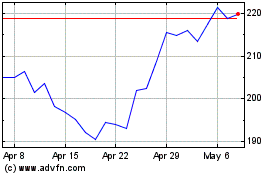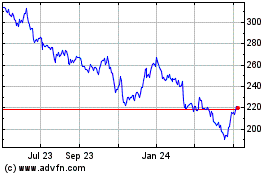Biogen, Reversing Itself, to Seek FDA OK for Alzheimer's Drug -- Update
October 22 2019 - 8:47AM
Dow Jones News
By Colin Kellaher
Biogen Inc. said it plans to pursue regulatory approval for
aducanumab, an investigational treatment for early Alzheimer's
disease, after pulling the plug on phase 3 studies of the drug
earlier this year.
Shares of Biogen surged 40% in premarket trading, putting the
company on track to add more than $16 billion in market value. When
the company and partner Eisai & Co. in March said they would
terminate the late-stage studies, Biogen lost about $18 billion in
market value.
The Cambridge, Mass., biopharmaceutical company said Tuesday
that the reversal follows an analysis of a larger dataset from the
studies that showed aducanumab reduced clinical decline in patients
with early Alzheimer's disease as measured by the prespecified
primary and secondary endpoints.
Biogen said it conducted the new analysis in consultation with
the U.S. Food and Drug Administration, and it included data that
became available after the prespecified futility analysis. In
March, the company and Eisai determined the drug would likely fail
to help patients.
The company said that based on discussions with the FDA, it
plans to file a biologics license application for aducanumab in
early 2020 and said it would continue talks with regulatory
authorities in international markets, including Europe and
Japan.
The reversal brings renewed hope to the hypothesis that has
informed much of the recent research and investment into potential
Alzheimer's drugs: that the buildup in the brain of a sticky
substance called Beta amyloid plays a pivotal role in the
disease.
Drugs like aducanumab have targeted the sticky tangles with the
goal of slowing or halting the progression of the disorder. But a
number of drugs developed with the idea in mind have failed.
Aducanumab was an important bet for Biogen because the biotech
company has been looking to Alzheimer's disease treatment to fuel
future revenue growth, especially as competition eats into sales of
its core franchise of drugs treating multiple sclerosis.
Many investors were also taken by the company's wager on
Alzheimer's. The massive market opportunity treating the
memory-robbing disease -- potentially worth billions of dollars a
year in sales -- as well as some promising data from early-stage
studies attracted new investors to the company and helped drive up
its share price.
Excited, too, by the potential opportunity, Biogen invested
heavily in recent years to enroll thousands of patients in
late-stage studies of aducanumab, some analysts said.
Biogen and Eisai, which had worked jointly on developing
aducanumab since October 2017, had been studying it in the early
stage of Alzheimer's. Researchers hypothesized that using the drug
early in the disease might be a more effective avenue for
amyloid-targeting therapy after previous such treatments at later
stages had failed.
Write to Colin Kellaher at colin.kellaher@wsj.com
(END) Dow Jones Newswires
October 22, 2019 08:32 ET (12:32 GMT)
Copyright (c) 2019 Dow Jones & Company, Inc.
Biogen (NASDAQ:BIIB)
Historical Stock Chart
From Aug 2024 to Sep 2024

Biogen (NASDAQ:BIIB)
Historical Stock Chart
From Sep 2023 to Sep 2024
